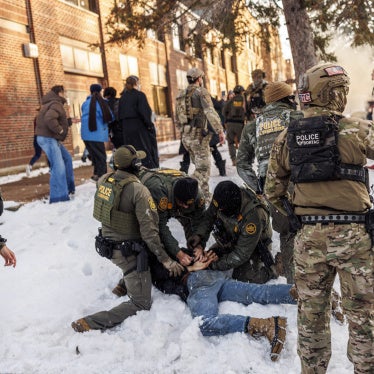The events that unfolded in Andijan, Uzbekistan on 13 May were a tragedy of yet unknown proportions. We believe that the United States can and should play a decisive role in ensuring that the violence is thoroughly investigated so that it does not occur again. We also believe that the time has come for the United States fundamentally to reevaluate its close security relationship with a government that uses lethal force against unarmed citizens.
After September 11, the United States understandably sought to use military bases in Uzbekistan to support military operations in Afghanistan. The United States also has tried to leverage its ties with President Karimov to push for progress on human rights in Uzbekistan. The Andijan tragedy, however, has left a new situation in its wake. Hundreds of people are dead, and human rights and democracy advocates around the country are being arrested and intimidated. President Karimov has flatly rejected calls by the U.S., the EU, NATO and the UN for an independent international investigation, and Uzbek authorities have used intimidation and restrictions on access to shroud the events of 13 May in secrecy. The Uzbek military and security institutions’ contacts with the United States clearly have not prevented them from engaging in the violence or cover up.
Under these circumstances, the U.S. military relationship with Uzbekistan, which provides President Karimov with considerable strategic and financial benefits, risks sending a mixed signal about America's real priorities. It also associates the U.S. with a government that brutally represses its people, and risks transforming the anger they feel against their own government into hatred of America. Whether we focus on the goals of promoting liberty or fighting terrorism, we believe that continuing business as usual with the government of Uzbekistan has become inimical both to the interests of the United States and those of the people of Uzbekistan.
We recognize that the United States still has important security interests in Central Asia relating to the war on terrorism. At the same time, since the fall of the Taliban, the U.S. has been able to maintain military bases inside Afghanistan and has additional access to facilities elsewhere in the region. On that basis, we strongly urge the United States to suspend any discussions with the government of Uzbekistan regarding the extension of U.S. military facilities there, and to announce its intention to explore alternative basing options in other countries. If President Karimov continues to reject an international investigation into the events of 13 May, the United States should bring an end to its post-September 11th strategic partnership with Uzbekistan and discontinue its military presence in the country, as part of a broader strategy to promote reform. The potential moral and strategic costs of remaining close to this regime far outweigh the additional costs and inconvenience that may be associated with finding alternative facilities.
While we understand that change in a country like Uzbekistan will take time, the United States needs to be unambiguously clear that it is on the side of those who are working peacefully for democratic change. You have argued many times that the United States has a paramount national interest in promoting political freedom and human rights, particularly in the Muslim world. Every element of the US relationship with Uzbekistan should be working towards that goal.
Sincerely,
Jennifer Windsor
Executive Director
Freedom House
Tom Malinowski
Washington Advocacy Director
Human Rights Watch
Mark Schneider
Senior Vice President
International Crisis Group







